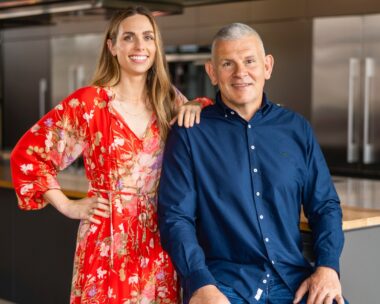When Football Fern Paige Satchell walks on to the field, she’s up against the same challenges as any professional athlete – trying to override pre-game nerves so she can perform at her best.
But up until 16 months ago, Paige had double the reason to worry. For her entire career, she’d lived with supraventricular tachycardia (SVT), a problem with the heart’s electrical system that causes sudden, extreme spikes in heart rate.
Paige’s symptoms didn’t strike often, but – in a cruel twist for the passionate footballer – it was always exercise that triggered them.
Admits the 25-year-old, “For every game, it was in the back of my head, ‘I hope my heart doesn’t do it today.’ Which isn’t great because the pressure’s high enough. For an international game, sometimes you only get one shot.”
In April 2022, the day Paige had been dreading arrived. Five minutes into a face-off between New Zealand and Australia, her symptoms kicked in. “I had to go down on the field, and the physio and doctor took me off, which was devastating.”
Up until then, Paige had resisted surgery, believing she could manage the non-life-threatening condition. But not any more. “This was impacting my career now.”

In October 2022, with the encouragement of her family – mum Kathy, dad Mike and sister Eillish, who are all nurses, plus brother-in-law Stanley Holt, who is a doctor – Paige underwent cardiac ablation at Auckland City Hospital.
She was conscious for all two hours of the remarkable procedure. Doctors went in through the top of her leg, threading tubes through her blood vessels, all the way to her heart. They induced the elevated heart rate so they could see which wires were sending mixed signals. Then they froze those wires to block the signals.
Ablation isn’t always a permanent fix, but it seems Paige is one of the lucky ones. She was back playing football within two weeks and, 16 months later, her symptoms haven’t returned.
“I’ll now be able to go through my football career without having to come off in a game because of SVT, which is unreal,” she marvels.
It’s a triumphant end to a long battle for Paige. She had her first SVT episode at 17, in a school PE class.
“I jumped and immediately my heart started racing,” she recalls. “I felt dizzy. It only lasted a couple of minutes. I thought, ‘That was weird, but I’m sure it was just a one-off.’”
It wasn’t. The episodes became longer – up to half an hour – and happened five or six times a year.
“Most of the time it was at football training. It would come out of nowhere. I would lie on the ground, put my feet up, block my nose and blow out, trying to get the heart rate down. Then it would finish as quickly as it came.”

Medical experts couldn’t give her a diagnosis because the episodes were so unpredictable that doctors couldn’t capture live data.
“At one stage, I thought, ‘Am I making it up?’ I knew what I was experiencing and I knew it wasn’t right, but we were never able to catch anything.”
That finally changed in late 2021. Paige was playing for Sydney FC and, as part of the pre-season medical, saw a cardiologist, who suggested she invest in an Apple Watch that would enable her to take her own electrocardiogram (ECG) any time. Two weeks later, Paige had another episode. When she saw the numbers on her new watch, she was gobsmacked. A normal heart rate is 60–100 beats per minute. Hers had gone over 200.
“I knew it was going fast, but to have that on paper was actually reassuring. I wasn’t making it up. The symptoms were real.”
At last, Paige’s cardiologist could diagnose SVT and explain her options. “I was like, ‘Whoa, surgery’s super-scary. I think I’ll just manage it for now.’”
Later that year, of course, she changed her mind – a decision she’s grateful for every day. She’s currently based in the UK, playing for the London City Lionesses, and will most likely join the Football Ferns in Paris this July for her second Olympic Games.
“Now I can play without fear that it’s going to happen. I can fully focus on what I need to do on the field.”
The Big Heart Appeal
Heart disease kills more than 6500 New Zealanders every year. This month, the Heart Foundation charity is asking Kiwis to support its life-saving work through the Big Heart Appeal. Look out for street collectors on 23 and 24 February or visit heartfoundation.org.nz to donate.
 Steve Dunlop
Steve Dunlop



